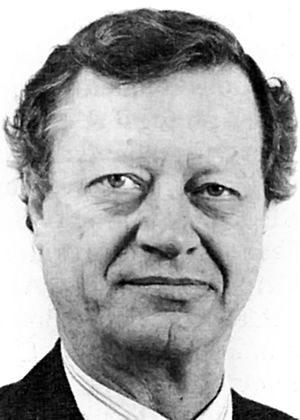Derek Keys facts for kids
Quick facts for kids
Derek Keys
|
|
|---|---|
 |
|
| Minister of Finance | |
| In office May 1992 – 19 September 1994 |
|
| President | F. W. de Klerk Nelson Mandela |
| Preceded by | Barend du Plessis |
| Succeeded by | Chris Liebenberg |
| Personal details | |
| Born |
Derek Lyle Keys
30 August 1931 Johannesburg, South Africa |
| Died | 29 April 2018 (aged 86) |
| Alma mater | University of the Witwatersrand |
Derek Lyle Keys (born 30 August 1931 – died 29 April 2018) was an important South African politician. He served as the Minister of Finance from 1992 to 1994. This means he was in charge of the country's money and economy. He worked under two presidents: F. W. de Klerk and Nelson Mandela.
Early Life and Education
Derek Keys was born in Johannesburg, South Africa, on 30 August 1931. He went to the University of the Witwatersrand. In 1950, he earned a degree in Commerce. By 1954, he became a chartered accountant. This is a professional who manages and checks financial records for businesses.
Building a Career
In 1956, Keys started working at the Industrial Development Corporation of South Africa. This organization helps build new industries in the country. For eight years, he helped develop many big industries in South Africa.
After that, for more than 20 years, Keys worked as a management consultant. This means he gave advice to many companies, both local and international, on how to run their businesses better. During this time, he joined the boards of companies like Asea, Sandvik, and Sappi.
Before he became a government minister, he was the main leader, or executive chairman, of a company called Gencor. He held this important role from 1986 until 1991.
Joining the Government
In December 1991, Derek Keys was asked to join the government. He became the Minister of Economic Co-ordination and of Trade and Industry. This job involved looking after the country's economy and its trade with other countries.
In May 1992, he was given an even bigger role. He also became the Minister of Finance. This meant he was responsible for all of South Africa's money matters. Before becoming a minister, he had already advised the government on things like electricity, taxes, and the economy.
Derek Keys resigned from his government roles on 6 July 1994. He was later replaced by a banker named Chris Liebenberg on 19 September.
 | Kyle Baker |
 | Joseph Yoakum |
 | Laura Wheeler Waring |
 | Henry Ossawa Tanner |

